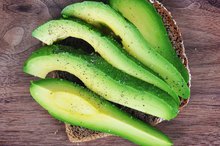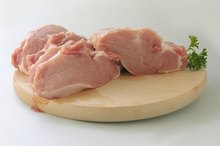What does fact checked mean?
At Healthfully, we strive to deliver objective content that is accurate and up-to-date. Our team periodically reviews articles in order to ensure content quality. The sources cited below consist of evidence from peer-reviewed journals, prominent medical organizations, academic associations, and government data.
The information contained on this site is for informational purposes only, and should not be used as a substitute for the advice of a professional health care provider. Please check with the appropriate physician regarding health questions and concerns. Although we strive to deliver accurate and up-to-date information, no guarantee to that effect is made.
Foods With No Vitamin K
Women need at least 75 micrograms of vitamin K per day, and men need at least 90 micrograms for proper blood clotting and bone density. People who take blood thinners, however, need to watch their vitamin K intake and keep it consistent so it doesn't interfere with their medication. Knowing which foods don't contain vitamin K can help with this 7.
Meat, Poultry and Seafood
Beef isn't a good choice if you're watching your vitamin K intake because it contains vitamin K. Pork products without vitamin K include ham, ground pork, Canadian bacon and pork shoulder. If you want seafood, choose scallops. Chicken and turkey, including turkey giblets, are good poultry choices, but don't eat the skin because this can contain small amounts of vitamin K.
Legumes, Nuts and Seeds
Vitamin K-2 Food Sources
Learn More
Legumes and some types of nuts and seeds provide vitamin K. Soybeans and kidney beans are the legumes with the most vitamin K, and cashews and pine nuts contain the highest amounts among nuts and seeds.
Fruits and Vegetables
Although vegetables are one of the main sources of vitamin K, corn and mushrooms don't contain this nutrient 4. Limit cooked green leafy vegetables, broccoli and asparagus, as these are among the vegetables with the most vitamin K. If you're on a blood-thinning medication, choose vegetables that are lower in vitamin K, such as:
- green beans
- peas
- lettuce
- cucumber
Grains and Pasta
How to Lose Weight While on Coumadin
Learn More
Avoid pastas made with spinach or with other grains not listed previously because these contain at least small amounts of vitamin K.
Dairy and Eggs
You can eat a serving of some dairy products without increasing your vitamin K intake.
Related Articles
References
- USDA National Nutrient Database: Nutrient Lists: Vitamin K, Beef, Grains, Dairy and Egg
- USDA National Nutrient Database: Nutrient Lists: Vitamin K, Seafood, Fruit, Lamb and Veal
- USDA National Nutrient Database: Nutrient Lists: Vitamin K, Legumes, Nuts and Pork
- USDA National Nutrient Database: Nutrient Lists: Vitamin K, Poultry and Vegetables
- Linus Pauling Institute: Vitamin K
- University of Maryland Medical Center: Vitamin K
- Coumadin.com: Foods With Vitamin K
- Holick MF, Gordon CM. Patient Guide to Vitamin D Deficiency. The Journal of Clinical Endocrinology & Metabolism. 2011;96(7):1-2. doi:10.1210/jcem.96.7.zeg33a
- Sunyecz JA. The use of calcium and vitamin D in the management of osteoporosis. Ther Clin Risk Manag. 2008;4(4):827-836. doi:10.2147/tcrm.s3552
- Giovannucci E, Liu Y, Hollis BW, Rimm EB. 25-hydroxyvitamin D and risk of myocardial infarction in men: a prospective study. Arch Intern Med. 2008;168(11):1174-1180. doi:10.1001/archinte.168.11.1174
- Gorham ED, Garland CF, Garland FC, et al. Optimal vitamin D status for colorectal cancer prevention: a quantitative meta analysis. Am J Prev Med. 2007;32(3):210-216. doi:10.1016/j.amepre.2006.11.004
- Lappe JM, Travers-Gustafson D, Davies KM, Recker RR, Heaney RP. Vitamin D and calcium supplementation reduces cancer risk: results of a randomized trial. The American Journal of Clinical Nutrition. 2007;85(6):1586-1591. doi:10.1093/ajcn/85.6.1586
- Prentice RL, Pettinger MB, Jackson RD, et al. Health risks and benefits from calcium and vitamin D supplementation: Women’s Health Initiative clinical trial and cohort study. Osteoporos Int. 2013;24(2):567-580. doi:10.1007/s00198-012-2224-2
- Urashima M, Segawa T, Okazaki M, Kurihara M, Wada Y, Ida H. Randomized trial of vitamin D supplementation to prevent seasonal influenza A in schoolchildren. Am J Clin Nutr. 2010;91(5):1255-1260. doi:10.3945/ajcn.2009.29094
- Salehpour A, Hosseinpanah F, Shidfar F, et al. A 12-week double-blind randomized clinical trial of vitamin D₃ supplementation on body fat mass in healthy overweight and obese women. Nutr J. 2012;11:78. doi:10.1186/1475-2891-11-78
- Carrillo AE, Flynn MG, Pinkston C, et al. Impact of vitamin D supplementation during a resistance training intervention on body composition, muscle function, and glucose tolerance in overweight and obese adults. Clin Nutr. 2013;32(3):375-381. doi:10.1016/j.clnu.2012.08.014
- Marcinowska-Suchowierska E, Kupisz-Urbańska M, Łukaszkiewicz J, Płudowski P, Jones G. Vitamin D Toxicity-A Clinical Perspective. Front Endocrinol. 2018;9:550. doi:10.3389/fendo.2018.00550
- Ross AC, Manson JE, Abrams SA, et al. The 2011 report on dietary reference intakes for calcium and vitamin D from the Institute of Medicine: what clinicians need to know. J Clin Endocrinol Metab. 2011;96(1):53-58. doi:10.1210/jc.2010-2704
- Bouillon R, Van Schoor NM, Gielen E, et al. Optimal vitamin D status: a critical analysis on the basis of evidence-based medicine. J Clin Endocrinol Metab. 2013;98(8):E1283-E1304. doi:10.1210/jc.2013-1195
- American Academy of Dermatology. Position Statement of Vitamin D. 2010.
- Taksler GB, Cutler DM, Giovannucci E, Keating NL. Vitamin D deficiency in minority populations. Public Health Nutr. 2015;18(3):379-391. doi:10.1017/S1368980014000457
- Holick MF, Binkley NC, Bischoff-Ferrari HA, et al. Evaluation, treatment, and prevention of vitamin D deficiency: an Endocrine Society clinical practice guideline. J Clin Endocrinol Metab. 2011;96(7):1911-1930. doi:10.1210/jc.2011-0385
- Cannell JJ, Vieth R, Umhau JC, et al. Epidemic Influenza and Vitamin D. Epidemiol Infect. 2006; 134:1129-40.
- Carrillo AE1, Flynn MG, Pinkston C, Markofski MM, Jiang Y, Donkin SS, Teegarden D. Impact of Vitamin D Supplementation During a Resistance Training Intervention on Body Composition, Muscle Function, and Glucose Tolerance in Overweight and Obese Adults. Clin Nutr. 2013 Jun;32(3):375-81. doi: 10.1016/j.clnu.2012.08.014. Epub 2012 Aug 31.
- Ginde AA, Mansbach JM, Camargo CA, Jr. Association Between Serum 25-Hydroxyvitamin D Level and Upper Respiratory Tract Infection in the Third National Health and Nutrition Examination Survey. Arch Intern Med. 2009; 169:384-90.
- Giovannucci E, Liu Y, Hollis BW, Rimm EB. 25-hydroxyvitamin D and Risk of Myocardial Infarction in Men: a Prospective Study. Arch Intern Med. 2008; 168:1174-80.
- Gorham ED, Garland CF, Garland FC, Grant WB, Mohr SB, Lipkin M, Newmark HL, Giovannucci E, Wei M, Holick MF. Optimal Vitamin D Status for Colorectal Cancer Prevention: a Quantitative Meta-analysis. Am J Prev Med. 2007 Mar;32(3):210-6.
- Heaney, Robert P. “The Vitamin D Requirement in Health and Disease.” The Journal of Steroid Biochemistry & Molecular Biology 97 (2005):13-9.
- Holick MF. Vitamin D. In: Shils M, Olson J, Shike M, Ross AC, ed. Modern Nutrition in Health and Disease, 9th ed. Baltimore: Williams and Wilkins, 1999.
- National Institutes of Health Office of Dietary Supplements. Vitamin D: Dietary Supplement Fact Sheet. University of Ottawa Evidence-based Practice Center. Effectiveness and Safety of Vitamin D in Relation to Bone Health. Agency for Healthcare Research and Quality. Aug 2007: 07-E013.
- Salehpour A1, Hosseinpanah F, Shidfar F, Vafa M, Razaghi M, Dehghani S, Hoshiarrad A, Gohari M. A 12-week Double-blind Randomized Clinical Trial of Vitamin D₃ Supplementation on Body Fat Mass in Healthy Overweight and Obese Women. Nutr J. 2012 Sep 22;11:78. doi: 10.1186/1475-2891-11-78.
- Urashima M, Segawa T, Okazaki M, Kurihara M, Wada Y, Ida H. Randomized Trial of Vitamin D Supplementation to Prevent Seasonal Influenza A in Schoolchildren. Am J Clin Nutr. 2010 91:1255-60. Epub 2010 Mar 10.
- Wilkins, Consuelo H. and Yvette I. Sheline, et al. “Vitamin D Deficiency Is Associated with Low Mood and Worse Cognitive Performance in Older Adults.” American Journal of Geriatric Psychiatry 14 (2006): 1032-40.
Writer Bio
Based in Massachusetts, Jessica Bruso has been writing since 2008. She holds a master of science degree in food policy and applied nutrition and a bachelor of arts degree in international relations, both from Tufts University.









